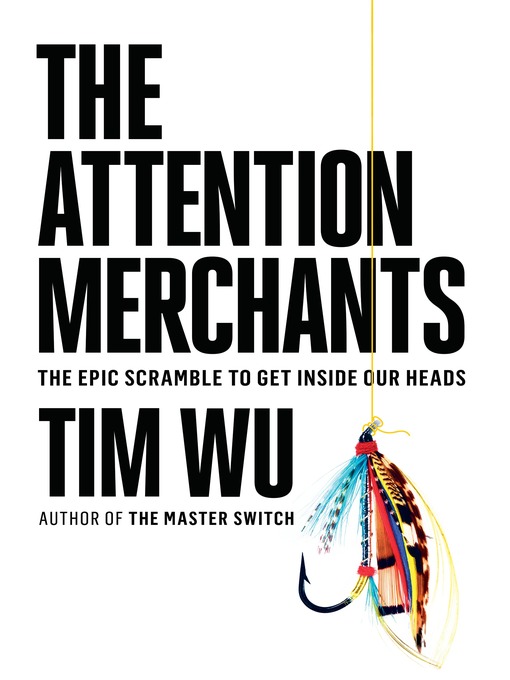- All Fiction
- Military Fiction
- Historical Fiction
- Mystery & Thriller
- Romance
- See all fiction collections
Feeling attention challenged? Even assaulted? American business depends on it. In nearly every moment of our waking lives, we face a barrage of messaging, advertising enticements, branding, sponsored social media, and other efforts to harvest our attention. Few moments or spaces of our day remain uncultivated by the "attention merchants," contributing to the distracted, unfocused tenor of our times. Tim Wu argues that this condition is not simply the byproduct of recent technological innovations but the result of more than a century's growth and expansion in the industries that feed on human attention. From the pre-Madison Avenue birth of advertising to the explosion of the mobile web; from AOL and the invention of email to the attention monopolies of Google and Facebook; from Ed Sullivan to celebrity power brands like Oprah Winfrey, Kim Kardashian and Donald Trump, the basic business model of "attention merchants" has never changed: free diversion in exchange for a moment of your consideration, sold in turn to the highest-bidding advertiser. Wu describes the revolts that have risen against the relentless siege of our awareness, from the remote control to the creation of public broadcasting to Apple's ad-blocking OS. But he makes clear that attention merchants are always growing new heads, even as their means of getting inside our heads are changing our very nature—cognitive, social, political and otherwise—in ways unimaginable even a generation ago.
“A startling and sweeping examination of the increasingly ubiquitous commercial effort to capture and commodify our attention…We’ve become the consumers, the producers, and the content. We are selling ourselves to ourselves.”
—Tom Vanderbilt, The New Republic
“An erudite, energizing, outraging, funny and thorough history…A devastating critique of ad tech as it stands today, transforming "don't be evil" into the surveillance business model in just a few short years. It connects the dots between the sale of advertising inventory in schools to the bizarre ecosystem of trackers, analyzers and machine-learning models that allow the things you look at on the web to look back at you…This stuff is my daily beat, and I learned a lot from Attention Merchants.”
—Cory Doctorow, BoingBoing
“Illuminating.”
—Jacob Weisberg, The New York Review of Books
-
Creators
-
Publisher
-
Release date
October 18, 2016 -
Formats
-
OverDrive Listen audiobook
- ISBN: 9781524709273
- File size: 444563 KB
- Duration: 15:26:10
-
-
Languages
- English
-
Reviews
-
AudioFile Magazine
Organized as a satisfying history of advertising and marketing, this audio is also a philosophical look at who tries to co-opt our attention and how we've resisted each new intrusion into our lives. Marc Cashman narrates with an effective combination of measured enthusiasm and thoughtful engagement with these ideas. His diction and phrasing are pleasing, and his energy connects well with the historical arcs and themes in the book. Tim Wu uses today's pervasive data collection of our Internet behavior and other examples to illuminate the divide between our being effective stewards of our own attention as compared to mindlessly responding to commercial and political messaging. With Cashman's performance making every idea and theme comprehensible, this is a fascinating and well-documented look at the rapidly accelerating tension between individual intention and organizational interests. T.W. © AudioFile 2016, Portland, Maine -
Publisher's Weekly
August 8, 2016
Business is always trying to get our attention—and perhaps our souls—according to this lively if sometimes overwrought history of advertiser-sponsored media. Columbia law professor and net-neutrality advocate Wu (The Master Switch) takes readers from the 19th-century dawn of New York’s penny press, when media moguls first realized that the attention of readers was their “product” and advertisers their customers, through the propaganda of wartime Britain and Nazi Germany, the advent of television’s mesmeric power, and ultimately the current onslaught of garish pop-ups and click-bait junk-journalism fighting to hijack our eyeballs on the Internet. Wu’s critique of the Kardashianized spiritual malaise of our society of the spectacle—“We are at risk of being not merely informed but manipulated and even deceived by ads... of living lives that are less fully our own than we imagine,” he groans—feels old hat; the real problem seems to be simply how to prune back ads that have grown too invasive and annoying. Fortunately, his history is usually vigorous and amusing, filled with details of colorful hucksterism and cunning attention-grabbing ploys along with revealing insights into the behavioral quirks they instill in us. The result is an engrossing study of what we hate about commercial media.
-
Loading
Why is availability limited?
×Availability can change throughout the month based on the library's budget. You can still place a hold on the title, and your hold will be automatically filled as soon as the title is available again.
The Kindle Book format for this title is not supported on:
×Read-along ebook
×The OverDrive Read format of this ebook has professional narration that plays while you read in your browser. Learn more here.


